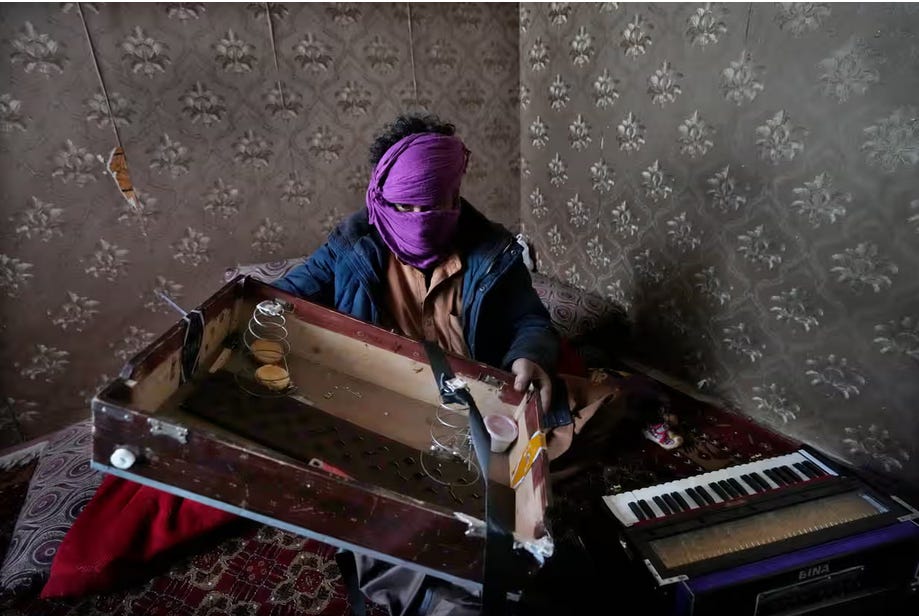(#060) Saving Afghan Music
Every week, a story from the world about how music can help us make sense of reality and how reality can help us make sense of music.
N.B. Per leggere questa storia in italiano, clicca qui. Per ricevere le prossime storie in italiano, clicca qui e sotto la voce notifiche deseleziona Touring (ENG) e seleziona Touring (ITA)
“There is nothing like the sight of an amputated spirit,” says a retired blind general played by Al Pacino in the 1992 masterpiece film Scent of a Woman, at the end of a memorable monologue in the courtlike setting of a disciplinary hearing at a prestigious private school in the US. “There’s no prosthetic for that,” he adds. It’s not easy to picture something as abstract as an amputated spirit, an unnaturally and deliberately damaged soul. When I first saw this picture, though, in a 2023 BBC article, the image of an amputated spirit evoked by Al Pacino’s character seemed particularly fitting.
The setting is a typical Central Asian tundra, dry and deserted. On the left are four bearded men dressed in white in a fashion that over the years we have learned to associate to Islamic fundamentalism. They are standing and observing a bonfire on the right, a bonfire comprised of dozens of objects that at first glance look like common trash. They’re not. If you zoom in, you will recognize a hi-fi speaker on the left, two jukeboxes at the top, one guitar at the center, and several box-like black objects that are likely to be DJ-ing equipment on the right. This is not just a bonfire in the desert. The picture was triumphantly shared by the Afghan Ministry for the propagation of virtue and the prevention of vice as the successful burning of “illegal instruments”. An attempt to burn music, to burn art. An attempt, ultimately, to amputate a spirit.
The picture was taken in the Afghan desert, and the men on the left are security guards for the Taliban, the Islamic group that returned to power in the country in 2021 after 20 years of US-aligned rule. Since taking over Kabul, the Taliban have begun enforcing a strict interpretation of Islamic Sharia law, just like they had done at the end of the 1990s during their first stint in government. In its most read feature, this newsletter covered the morality law that was passed in Afghanistan last year, which among other things attempted to erase women’s voices - seen as “instruments of vice” - sparking online protests by several dozens of corageous women. If you missed it and are curious, here is a link to that piece. Now, for the first feature of 2025, we add a few more pieces to the puzzle that is Afghan music under the Taliban: the picture above, an anecdote from the days immediately prior to the Taliban return that concerns Afghan musicians, and the words of the man who is trying to save Afghan music one cassette at the time.
50% off
In August 2021, when it had become clear that the Taliban were ready to enter Kabul, social media shopping pages in Afghanistan started being flooded with unusual deals. Instruments, DJ-ing equipment, hi-fi speakers, microphones, jukeboxes, all sold by their owners at half price. In normal conditions, they likely would have been sold out within minutes. Yet, those weren’t normal conditions. The reason why they were being put up for sale, and the reason no one was buying, was simple enough. They knew that as soon as the Taliban returned to power, those instruments would make them targets. And so it was.
“Of the many aspects of life affected by the war in Afghanistan, I would say art and culture are among the worst affected,” said Omaid Sharifi, co-founder of ArtLords, a collective that has worked to revive Afghan art and culture since 2014, to The Guardian. As soon as they returned, the Taliban passed a law criminalizing music and art on grounds of “moral corruption”, and sought those who were guilty of such crimes. Some escaped and are still living in exile. Others, like folk singer Fawad Andarabi, were killed. Little by little, one of the culturally richest regions in the world, a country that legend has it is so connected to art and music that if you dig five meters anywhere you will find some artifact, was silenced, empoverished. Amputated.
One cassette at the time
Once upon a time, Mohammed Hasan Zamri sold tapes for a living. Today, he collects them. An Afghan-born music fan, Zamri escaped Afghanistan during the Soviet invasion in the 1980s, and since the Taliban’s first quest for power in the 1990s, he has been collecting cassettes of old Afghan music and copying them, in the hope to one day digitalize them. Today, he owns a shop in Pashawar, Pakistan, in which he fixes tape recorders and TVs. Most of the space in his small workshop, though, as seen below, is taken up by stacks of cassettes, neatly arranged on a wall opposite the entrance. His collection includes tapes of renowned Afghan musicians including Munawar, Nashenas, Taj Mohammad and Haikal.
His mission is simple: preserve Afghan music, so that one day future generations who are today being raised in a country where that same music is today illegal. “Those were the old golden days and today’s generation sadly don’t know much about those days of music – and coming generations will know nothing,” he told The Guardian.
To those who dismiss his activity as either useless or dangerous, he says: “They don’t understand. They either don’t have a soul, or brains to like music. Some people are addicted to smoking, some people love pets and some are fond of many other things. I am addicted to Afghan music. It is my hobby and passion.”
Maybe then, to contradict Al Pacino, a prosthetic for amputated spirits can exist.
From now on and for the foreseeable future, Touring will come out on Saturdays, so I’ll be in your inbox next Saturday, with another story. Meanwhile, feel free to reach me with any comment or suggestion about this and future stories by emailing me at zeric.bojan@gmail.com or contacting me on Instagram at bojan.zer0.








